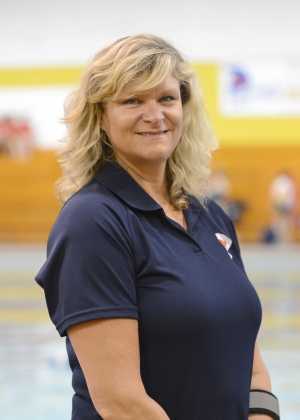Features
September 21, 2024
2024 National Coaches Week Feature

Anne Ottenbrite-Muylaert
Anne Ottenbrite may have been the bridge that changed an anonymous young female swimmer into an italicized celebrity.
Not one for bragging about personal accomplishments, she just might be the person – or one of them – who years ago saw Canada’s swim community pour its hopes for the future. Maybe obscure, or incognito, several decades back as a swimmer, things changed rapidly.
A self-described “water baby” at age three, growing up with a pool in her family home backyard, Ottenbrite would emerge as the first woman in Canada to win a gold medal in swimming. Another gold would follow a short time later, as well as a silver.
It all happened in 1982 at the Commonwealth Games in Brisbane, Australia – and at a time when the country’s unofficial national anthem had people, in celebratory fashion, singing “Waltzing Matilda”. At the same time, on the streets outside the Chandler Aquatic Centre, large-scale protests, by the Aboriginal rights movement in Australia, had drawn international media attention.
But there was a different kind of hullabaloo at poolside.
Ottenbrite, relatively unknown to the world swimming community, sparked attention. In the 200-metres breaststroke, she was dominant. Timed in an impressive two minutes, 30.38 seconds, crowds were stunned even after she received the gold medal. There was euphoria and happiness for Ottenbrite.
All this was happening while, just about 30 minutes earlier, Alex Baumann had won the 400-metres individual medley, which became the first gold medal won by a Canadian in the pool in 72 years.
Now, you know a fascinating snapshot in Canadian swimming history.
But this story is about Ottenbrite, who was born in Bowmanville, a town about one hour east of Toronto. She spent most of her young life in nearby Whitby and attended Henry Street High – but was too busy with club swimming to partake in school sports.
For her, home now is in a place called Burketon Station, a small community of a few hundred people, that makes up the eastern boundary of the growing Greater Toronto Area. One might wager that most people working or living in a 50-mile radius of her home may not be aware that Ottenbrite, a Canadian sports celebrity, resides in that community.

Enthusiasm for her is being in, or near, water. It has paved the way to joyfulness and, eventually, what some call a form of paradise after she was recruited for a life of education and swimming in the United States. Ottenbrite had accepted a full athletic scholarship to the University of Southern California in Los Angeles.
While she had started to swim competitively for the Oshawa Aquatic Club at age 13, she then moved on to the Ajax Aquatic Club. In the back of her mind, she was inching closer to her childhood ambition of competing in the Olympic Games.
That would indeed come true after returning to a sprawling California – and a megalopolitan place often referred to as “la-la land” for being the centre of movies and television and the home to that iconic Hollywood sign.
For Ottenbrite, though, she was focussed on the 1984 Olympics – and the world’s gala sporting event. It was also an international event affected by a boycott that involved many communist countries.
But this time, Ottenbrite would leave “The City of Angeles” with three colorful medals – that gold in the 200-metres breaststroke, a silver in the 100-metres breaststroke and she would end her Olympic performance, with her specialty stroke, earning a bronze as a member of the 4x100-metres medley relay.
“It certainly was a special time in my life,” said Ottenbrite-Muylaert, who now goes by her married name. “I grew up in an environment with no hierarchy of excitement and my life became part of a wonderland story.”
There may be a touch of irony in her story, too.
Ottenbrite had some notoriety associated with being accident prone. As a result, she almost missed being named to that Canadian team for those 1984 Olympics. She had been unable to swim at the Olympic Trials, after dislocating her kneecap in what can be called a freak accident.
Selection team officials, having viewed her success in the weeks and months before, gambled and added Ottenbrite’s name to the Canadian contingent. It turned out to be a smart decision.
One more note of vital importance. Even before the Olympics started, Ottenbrite sustained a whiplash neck injury from a vehicle accident in Los Angeles. Injuries continued – including the time she strained a thigh muscle while playing a video game. You read that correctly.
Swimming may have consumed a good chunk of her life, but Ottenbrite also focussed on her studies and did earn a degree. After two years at USC, she returned to Canada. With her goal of competing in the Olympics having been achieved, she packed in competitive swimming at age 22 and finished her post-secondary studies, fascinated with the world of sports psychology, while a student at Wilfrid Laurier University in Waterloo.
Owner of eight Canadian swim titles, then came the inaugural experience as a coach - and she hasn’t looked back. A total of 38 years offering guidance, advice and instruction – including 23 of those years as head coach of the Pickering Swim Club.
“Coaching wasn’t high on my list back then, but things happened quickly,” she recalled. I had a coaching opportunity with the Region of Waterloo, then it was Laurier and next came the University of Guelph.
“I look back and can see how fortunate I was. There were people who saw how incredibly passionate I became with helping young people and I was given the opportunity to coach in their (communities).”
Ottenbrite pursued coaching at various swim clubs and universities in Ontario, and one experience south of the border at the University of Wisconsin. Her consulting company called “Gold-Minds,” provided a variety of mental skills programs for all levels of athletes.
Having moved from great swimmer to great coach, and an advocate for more community pools across Ontario, one city named a swimming pool in her honour. Among the many other achievements and awards, Ottenbrite-Muylaert was inducted to the International Swimming Hall of Fame and Canada’s Sports Hall of Fame.
Swim Ontario is highlighting Ottenbrite-Muylaert – and especially during Canada’s salute to National Coaches Week which occurs from September 16 to 22.
Busy times as a coach of a club that uses several pools, from Pickering’s Chestnut Hill Developments Recreation Complex to Dunbarton High to the Toronto Pan Am Sports Centre, Ottenbrite-Muylaert calls her job “a fascinating profession”.
To her, the importance of coaching is also being honest with swimmers, parents and others.
“You (coach) for many reasons – maybe it’s a challenge, or you want to see swimmers empower themselves or it’s about working with people, during ups and downs, to help them try reach their goal,” she said.
“For me, it’s important to be with these young people during their successes and failures. Watching someone who has struggled, remain determined and then reach a level of success. It means a great deal to me. I call it a special moment and a gift to impact the lives of others in a positive way.”
David Grossman is a veteran multi award-winning Journalist and Broadcaster with some of Canada’s major media, including the Toronto Star and SPORTSNET 590 THE FAN, and a Public Relations professional for 50+ years in Canadian sports and Government relations.
